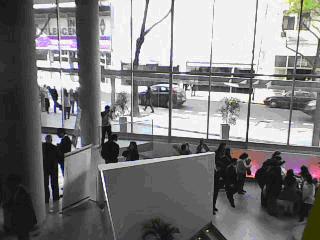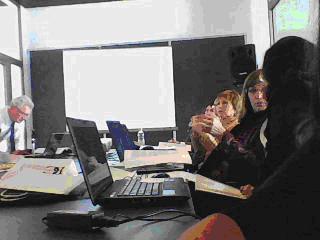IFLA workshop on transparency and good governance: Argentina
31 December 2011
On September 28, 2011, simultaneously with the “Access to information day”, the Workshop on transparency and good governance was carried out in Buenos Aires. Cosponsored by IFLA LAC, IFLA FAIFE and the Library of Congress of Argentina, the workshop was delivered by Paul Sturges, from the University of Loughborough, England, and by Alejandra Martínez del Prado, from the System of Libraries of the School of Medicine (UNAM), contributing to the exchange of ideas on how libraries can contribute to good governance and transparency.

Parallel to the enhanced possibilities of access to information and knowledge, the Library of Congress also enjoyed a marked growth in the number of readers; meanwhile its services reached a 90% of satisfactory responses, and measures have been taken to digitize library holdings, “in an ongoing process of digitalization”. The Senator also highlighted the importance of the recently launched Digesto Legal (a compendium of Argentinean laws), initiated as a bill aiming at reordering the laws in rule. With the efforts of more than 100 specialists, 300.000 laws were ordered and simplified, comprising them into a Digesto of only 3.600 norms, conveniently classified to make its free online access easier.
The challenge, she said, is to “regionalize, federalize and build a true Latin American and world network that strengthens us all”. To that end, she deemed necessary to think on every-day tasks as a work of projection, so that citizens are connected even in the farthest corner of the world.

While in the past, libraries were custodians of information, protecting the integrity of its interpretation and the unity of its sense, today librarians protect the values of freedom of opinion and expression, and should take article 19 as their belief and promote it to everyone.
Afterwards, the manager of the library services, Alejandro Santa, described the key aspects of the administration: open access, free services and equal opportunities. He thanked the presence of the staff, unions and representatives of other libraries. He mentioned the importance of promoting networks, increasing strengths and learning from weaknesses to improve performance. “The Parliament is the people’s administration”, he said, “and the role of the librarian is optimized with new technologies. Librarians will not disappear: googling is not magic”. He also said to be pleased at the recent creation the library’s cultural extension center, which will be complementary to the services and activities of the library, and serve as feedback to them.
The closing speech was delivered by Argentine historian Felipe Pigna, who took a retrospective glance at the issue of access to information, evoking the invention of writing, more than 6,000 years ago. The invention of writing meant a change in the way information was made accessible. However not until the late nineteenth century and the beginning of the twentieth century did the number of literate people increase, as reading and writing skills had been banned to the majority of people as a way to preserve the power in the dominant elites.
He also mentioned the concept of “good government”, originated in Spain, more specifically in the Siete partidas (Seven-part code) compiled during the reign of Alfonso X of Castile, a king who claimed that a good government responds to the expectation of the people, being the ruler necessarily at the service of the ruled —which, Pigna said, by no means justifies the invasion initiated in the Crusades and continued in the conquest and genocide of America.
In the region, the concept of good government reverberates in the anticolonialist claims of José Gabriel Condorcanqui, also known as Túpac Amaru II, who argued that a legitimate government should be established to avoid people from being charged unjust taxes. Condorcanqui’s rebellion is the most important and widely known upheaval of the colonial times in America. However, it was no later than 1493, with the Antillean rebellion, when people began to demonstrate against the conquest and genocide. With the independent movements in Argentina, Manuel Belgrano’s ideas began to spread. Pioneer of popular education, he said: “Without education there is no nation, no homeland; the economy and progress depends upon education of the people.” Since then, libraries have been the place where culture is socialized, and the measures taken by Mariano Moreno bear testimony to the efforts of these men to promote equal access to knowledge, regardless of caste, gender, age or race.
Pigna also mentioned the uses of history and its access as a preventive measure, referring to two polemic and emblematic figures: San Martin and Sarmiento, while recounting two events from the recent history in Argentina. The first one referred to the President of the Rural Society in Argentina, Hugo Biolcati, who usually quotes Sarmiento in his speeches to support institutional policies. However, the productive model in which Sarmiento believed was based on a medium-scale exploitation strategy, just as it was by the time developed in Chivilicoy, Province of Buenos Aires. Such a model allowed population settlements, better use of soils and a more sustainable development in the long term. On the other hand, the landowner oligarchy, gathered in the Rural Society, preferred the large estate exploitation, and underested Sarmiento’s reasoning arguing that it was against Argentina’s traditions of vast extensions.
The second one related to the bicentennial of the birth of José de San Martín, in 1978. In the commemoration speech, de facto president Jorge Rafael Videla was quoted to have said more or less the following: “If San Martín were alive, he would be proud of the task undertaken by this sanmartinean army against subversion”. However, facts are eloquent: while San Martín created many libraries, the Junta Militar burnt more than a million books; furthermore, according to the code of honor of San Martín’s army, soldiers should be twice more respectful to civilians than soldiers by reason of the power vested in them. Therefore, he encouraged us all to read history in order to be warned.
Pigna valued the right to access, communication and creation, and highlighted the relevance of libraries. He talked about his experience in Colombia, and the importance of library parks in highly-risky cities such as Medellín. “Libraries are elements of the future, rather than the past”, he said, evoking libraries’ atmosphere and the idea of social and common goods: “the book in a library is something one should take care of so that others can later use”. He also mentioned microfilming and digitization as techniques that help both preserve knowledge and widen access through networks that democratize research.
To sum up, Pigna recalled Mayan codes’s metaphor and cataclysm and said: “Mayans thought that the end of the world was the beginning of a new era in which the people would be invited to the supper from which they had been excluded”.
With Pigna’s speech, the opening session was concluded, and afterwards attendees were invited to join the workshop to discuss the importance of librarians’ role in making information increasingly accessible.
During the workshop, emphasis was given to the need of developing the capacity of library associations and librarians’ networks, so that experiences are shared and good practices are promoted. The workshop encouraged participation, and during the second part teams were formed to analyze specific sections of the IFLA Manifesto. Final directions included the design of socially relevant projects, with a national or international scope, contemplating the creation of librarians’ networks committed to widening access to information and knowledge.